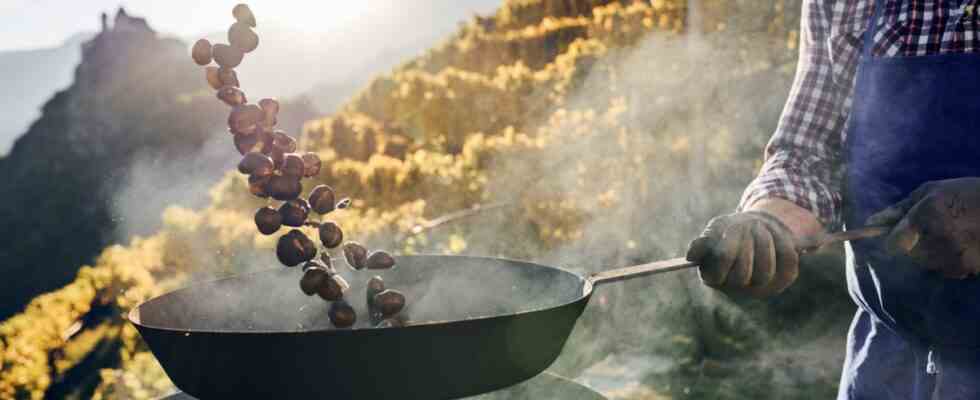Eggerhof on the Marlinger Berg
The two pigs “white” and “black”, which were mainly fed with whey on the Eggerhof, were transformed into sausages, pork loin, pork chops and ribs after going to the butcher in the hands of Fabian Reisner and his partner Emilia Rogel Serna. The pigs got their rather impersonal names, because the end was foreseeable, from Rogel Serna, who took care of them every day. “I didn’t want to grow too fond of them,” says the petite woman, who comes from Granada and used to be an acrobat.
Scottish highland cattle graze on the steep meadows around the farm near Marling. Here at 1260 meters you are always outside, even in winter. The robust animals are used to the cold – unlike their owner, who misses the Andalusian sun. Therefore, she will soon be traveling to the family for several weeks, while Reisner will remain at court. “Somebody has to hold the fort. That’s how it is as a livestock farmer, you can’t send the animals on vacation,” he says – with a smile that doesn’t tell whether he’s happy or sad about it. There is no doubt about it: how he talks about them, how he strokes their brown matted fur – Reisner says that a lifelong dream has come true for him at the Eggerhof, he likes his cattle. Even if he already sees them as a roast braised in South Tyrolean Lagrein. Guests eat on a glass-enclosed veranda overlooking the Martinskapelle and the sea of flickering lights far below in the basin.
Eggerhof/Schnauzerstube, Marlengo, open again from the first weekend in December. schnauzerstube.it
Johannserhof, Villanders
In history he is “brutally weak, my area is agriculture,” says Ewald Brunner, and in the paneled room he looks at a black-and-white picture above the door frame. On it you can see a worthy couple in traditional costume: They are his great-grandparents, who bought the farm, which was already old at the time, 100 years ago, sold the Gothic parlor due to lack of money (today it can be seen in the folklore museum in Innsbruck) and had the current one installed. There the guests now eat pork with dumplings and cabbage, and finally sweet donuts. They drink Zweigelt, Riesling or juice, almost everything from their own cultivation. The processing of our own pigs is becoming increasingly important, says Michaela Brunner. “We slaughtered two in September, four will be there by Christmas”. The farmer’s wife does a bit of educational work on the side: “Most of them just want schnitzel and drumsticks,” but the guests should understand the potential of the pig’s spine, for example, and “that fun, i.e. fat-laced meat, contributes to a good life”.
Michaela seems to have understood something about the meaning of life, at least her poems suggest that she does. At farm festivals or at Törggelen, the farmer’s wife reads from her self-published volume of poetry. It is about everyday farming life, nature, the children and beautiful women who play a role in her husband’s life. Each of Ewald’s 20 dairy cows goes by the name of a woman he likes. The guests, in turn, like the poems. All but three copies of the first edition (1000 copies) have been sold. Dying poets should come to the Johannserhof zum Törggelen for tips.
Johannserhof, Villanders, open until December 20th. The rest of the year on reservation. suedtirol.info/de
Oberbrunnhof, Parcines
“Anything is possible with a good woman,” says Manuel Laimer. And his wife knew what she was getting into at the wedding. She grew up on a neighboring farm, but carpenter Laimer dared to give up the job he had learned and take over his grandmother’s farm with her. The young couple now lives here with their three small children. “Everything was in a desolate condition, the stable and the outbuildings were almost dilapidated,” says Laimer, as he chats with the guests in the cellar, which has been converted into a courtyard tavern, while they drink an aperitif. “We skipped a generation on the farm. Neither my mother nor an uncle or aunt wanted to continue – a comfortable apartment and a job in the valley seemed more tempting.”
A little later, a platter of home-made sausage is steaming on the table – the meat is home-grown. Then there are chestnuts, fried in a perforated pan over an open fire, baked donuts with chestnut and apricot fillings, and a homemade herbal schnapps. On the way home, it becomes clear why the bright red aperitif made of blueberries, apples and mint is called “Siemr”: It is named after the natural phenomenon that can be seen opposite in the bright moonlight under the target tip: A seven made of dark rocks like a negative print, while all around is the snowy terrain shimmers silver. An unmistakable sign that winter is coming.
Oberbrunnhof, Parcines, Open by appointment until December. From March again on the weekends. oberbrunnhof.suedtirol.it

